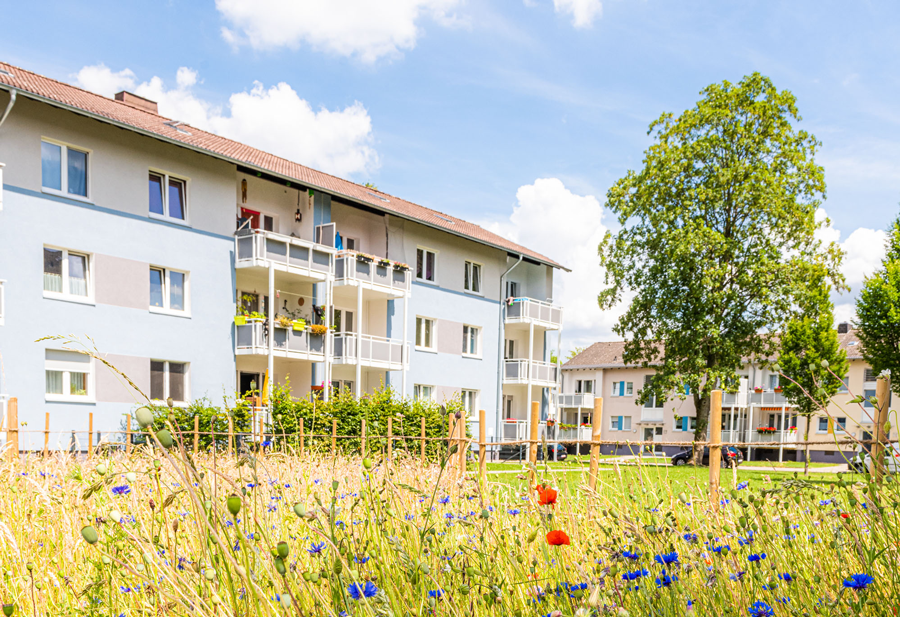Water, Effluents and Waste
GRI
303-5
306-2
The increasing scarcity of water is becoming an increasingly important topic of discussion in Germany. Climate change is already making itself known in the form of longer periods of dry weather and more frequent heavy rain and storms. We are assuming that these will become more common in the future. Although our portfolio has been relatively unaffected so far, we are preparing for the possible consequences. To this end, we are working on measures that will help to mitigate extreme weather conditions at a microclimate level or have the capacity to cool urban heat islands, such as greening the facades of buildings or installing roof trenches. We need an innovative approach to water management that will be able to handle the challenges of the future. There is significant potential in local rainwater seepage systems (based on retention basins and green roofs, for example) and using rainwater to water gardens.
We integrated additional risk and damage minimization measures into our standard processes during the reporting year. These include soil and flood surveys, which will allow us to draw up more effective water management plans for our neighborhoods. Our planning process includes a digital terrain model in order to minimize water damage. In the future we intend to use our existing geoinformation system to improve the available data even further so that we can plan and implement measures with even more precision. The BIM method (building information modeling) is one of the ways in which this is supported in the planning of open spaces.
Examples of water management measures in our portfolio:
- Partnership with NABU NRW to revitalize habitats in rainwater retention basins and to create green roofs and facades with the help of tenants (in progress since 2020)
- Implementation of a community development project with integrated rainwater management in the Eltingviertel in Essen (in progress since 2020)
- Implementation of a pilot project to prevent water damage by identifying and communicating burst pipes early in order to keep consequential damage to a minimum (in progress since 2020)
- Planning of integrated water management in the pilot neighborhood of Bochum-Weitmar (including cooperation and study with the Fraunhofer Society)
We use water-saving sanitary systems in our offices to reduce water consumption. We provide drinking water systems for the roughly 1,000 employees who work at the corporate headquarters in Bochum to reduce their use of plastic.
Waste separation concepts for good waste management and the promotion of recycling play a particularly important role in our construction and refurbishment work because they enable us to reuse valuable resources like windows (see Sustainable Construction and Refurbishment). They are also becoming increasingly relevant for waste management purposes in our neighborhoods. During the year under review, we expanded our use of sustainable recycling schemes in our neighborhoods. We launched a pilot project in a neighborhood in Essen to investigate ways in which we can recycle green waste and separate household waste. Our findings will be rolled out to other neighborhoods in the future. We separate the waste produced in offices and common areas and do not use disposable items in the cafeteria. In Sweden we involve our tenants in the subject of waste separation and tell them about the opportunities that exist in the area of waste separation and prevention. This is one of the ways in which we plan to significantly reduce the amount of waste in Sweden – by 30 % by 2030.
By means of careful documentation and monitoring of the work carried out on the construction sites by qualified staff and health and safety officers, we always strive to ensure that (contaminated) materials are disposed of correctly and lawfully. We provide Vonovia technicians with training on how to dispose of materials correctly.
There is also potential in how we manage our green spaces. We recycle horticultural waste for energy production in biomass power plants, compost green waste and use leftover wood offcuts as lumber. We are making use of these opportunities by developing new and sustainable schemes for recycling and reusing materials.


